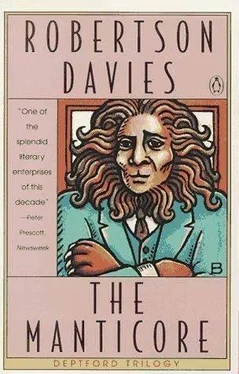DR. VON HALLER: The retarded daughter?
MYSELF: An embarrassing nuisance, Denyse's problem. But Denyse liked problems and wanted to add me to her list.
DR. VON HALLER: Because of your drinking. When did that begin?
MYSELF: In Pittstown it began to be serious. It is very lonely living in a small town where you are anxious to seem quite ordinary but everybody knows that there is a great fortune, as they put it, "behind you". How far behind, or whether you really have anything more than a romantic claim on it, nobody knows or cares. More than once I would hear some Pittstown worthy whisper of me, "He doesn't have to work, you know; his father's Boy Staunton." But I did work; I tried to command my profession. I lived in the best hotel in town, which, God knows, was a dismal hole with wretched food; I confined my living to a hundred and twenty-five dollars a week, which was about what a rising young lawyer might be expected to have. I wanted no favours and if it had been practical to take another name I would have done it. Nobody understood, except Diarmuid, and I didn't care whether they understood or not. But it was lonely, and while I was hammering out the character of David Staunton the rising criminal lawyer, I also created the character of David Staunton who drank too much. The two went well together in the eyes of many romantic people, who like a brilliant man to have some large, obvious flaw in his character.
DR. VON HALLER: This was the character you took with you to Toronto, where I suppose you embroidered it.
MYSELF: Embroidered it richly. I achieved a certain courtroom notoriety; in a lively case I drew a good many spectators because they wanted to see me win. They also had the occasional thrill of seeing me stagger. There were rumours, too, that I had extensive connections in the underworld, though that was nonsense. Still, it provided a whiff of sulphur for the mob.
DR. VON HALLER: In fact, you created a romantic Persona that successfully rivalled that of the rich, sexually adventurous Boy Staunton without ever challenging him on his own ground?
MYSELF: You might equally well say that I established myself as a man of significance in my own right without in any way wearing my father's cut-down clothes.
DR. VON HALLER: And when did the clash come?
MYSELF: The -?
DR. VON HALLER: The inevitable clash between your father and yourself. The clash that gave so much edge to the guilt and remorse you felt when he died, or was killed, or whichever it was.
MYSELF: I suppose it really came into the light when Denyse made it clear that her ambition was to see Father appointed Lieutenant-Governor of Ontario. She made it very clear to me that what she insisted on calling my "image" – she had a walletful of smart terms for everything – would not fit very well with my position as son of a man who was the Queen's representative.
DR. VON HALLER: In effect she wanted to reclaim you and make you into your father's son again.
MYSELF: Yes, and what a father! She is a great maker of images, is Denyse! It disgusted and grieved me to see Father being filed and pumiced down to meet that inordinate woman's idea of a fit candidate for ceremonial office. Before, he had style – his personal style: she made him into what she would have been if she had been born a man. He became an unimaginative woman's creation. Delilah had shorn his locks and assured him he looked much neater and cooler without them. He gave her his soul, and she transformed it into a cabbage. She reopened the whole business of the Staunton arms because he would need something of the sort in an official position and it looked better to take the position with all the necessary trappings than to cobble them up during his first months in office. Father had never told her about Maria Ann Dymock, and she wrote boldly to the College of Arms, and I gather she pretty much demanded that the arms of the Warwickshire Stauntons, with some appropriate differences, be officially granted to Father.
DR. VON HALLER: What did your father think about it?
MYSELF: Oh, he laughed it off. Said Denyse would manage it if anyone could. Didn't want to talk about it. But it never happened. The College took a long time answering letters and asked for information that was hard to provide. I knew all about it because by this time my old friend Pledger-Brown was one of the pursuivants, and we had always written to each other at least once a year. One of his letters said, as I remember it, "This can never be, you know; not even your Stepdame's New World determination can make you Stauntons of Longbridge. My colleague in charge of the matter is trying to persuade her to apply for new arms, which your father might legitimately have, for after all bags of gold are a very fair earnest of gentility, and always have been. But she is resolute, and nothing will do but a long and very respectable descent. It is one of the touching aspects of our work here in the College that so many of you New World people, up to the eyebrows in all the delights of republicanism, hanker after a link with what is ancient and rubbed by time to a fine sheen. It's more than snobbery; more than romanticism; it's a desire for an ancestry that somehow postulates a posterity and for an existence in the past that is a covert guarantee of immortality in the future. You talk about individualism; what you truly want is to be links in a long unbroken chain. But you, with our secret about Maria Ann and the child whose father might have been all Staunton, know of a truth which is every bit as good in its way, even though you use it only as food for your sullen absalonism."
DR. VON HALLER: Absalonism; I do not know that word. Explain it, please.
MYSELF: It was one of Adrian's revivals of old words. It refers to Absalom, the son of King David, who resisted and revolted against his father.
DR. VON HALLER: A good word. I shall remember it.
The time was drawing near to Christmas, when I knew that Dr. von Haller would make some break in my series of appointments. But I was not prepared for what she said when next we met.
"Well, Mr. Staunton, we seem to have come to the end of your anamnesis . Now it is necessary to make a decision about what you are going to do next."
"The end? But I have a sheaf of notes still! I have all sorts of questions to ask."
"Doubtless. It is possible to go on as we have been doing for several years. But you have been at this work for a little more than one year, and although we could haggle over fine points and probe sore places for at least another year, I think that for you that is unnecessary. Ask your questions of yourself. You are now in a position to answer them."
"But if I give wrong answers?"
"You will soon know that they are wrong. We have canvassed the main points in the story of your life; you are equipped to attend to details."
"I don't feel it. I'm not nearly through with what I have to say."
"Have you anything to say that seems to you extraordinary?"
"But surely I have been having the most remarkable spiritual – well, anyhow, psychological – adventures?"
"By no means, Mr. Staunton. Remarkable in your personal experience, which is what counts, but – forgive me – not at all remarkable in mine."
"Then you mean this is the end of my work with you?"
"Not if you decide otherwise. But it is the end of this work – this reassessment of some personal, profound experience. But what is most personal is not what is most profound. If you want to continue – and you must not be in a hurry to say you will – we shall proceed quite differently. We shall examine the archetypes with which you are already superficially familiar, and we shall go beyond what is personal about them. I assure you that is very close and psychologically demanding work. It cannot be undertaken if you are always craving to be back in Toronto, putting Alpha and Castor and all those things into good order. But you are drinking quite moderately now, aren't you? The symptom you complained of has been corrected. Wasn't that what you wanted?"
Читать дальше












